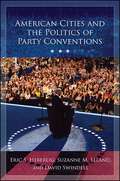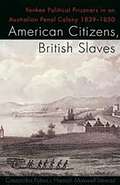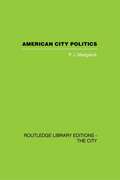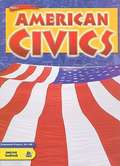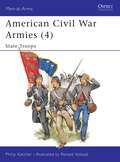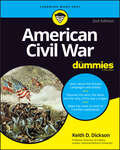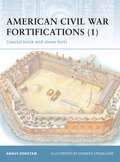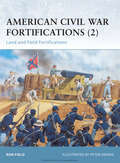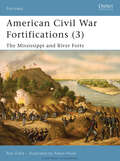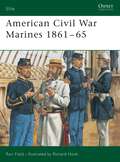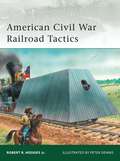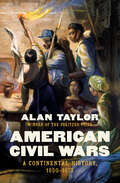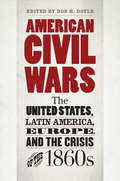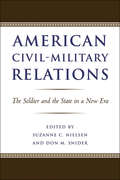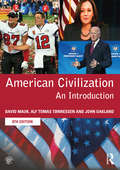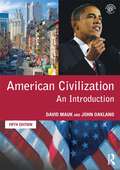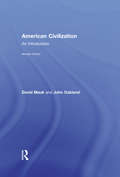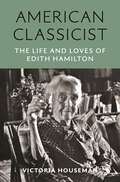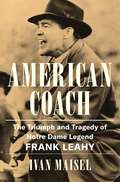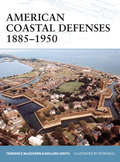- Table View
- List View
American Cities and the Politics of Party Conventions
by Eric S. Heberlig Suzanne M. Leland David SwindellPolitical party conventions have lost much of their original political nature, serving now primarily as elaborate infomercials while ratifying the decisions made by voters in state primaries and caucuses. While this activity hasn't changed significantly since the 1970s, conventions themselves have changed significantly in terms of how they are recruited, implemented, and paid for. American Cities and the Politics of Party Conventions analyzes how and why cities advance through the site selection process. Just as parties use conventions to communicate their policies, unity, and competence to the electorate, cities use the convention selection process to communicate their merits to political parties, businesses and residents. While hosting such a "mega event" provides some direct economic stimulus for host cities, the major benefit of the convention is the opportunity it provides for branding and signaling status. Combining a case studies approach as well as interviews with party and local officials, Eric S. Heberlig, Suzanne M. Leland, and David Swindell bring party convention scholarship up to date while highlighting the costs and benefits of hosting such events for tourism bureaus, city administrators, elected officials, and the citizens they represent.
American Citizens, British Slaves
by Cassandra Pybus Hamish Maxwell-StewartWe hardly had our feet on the soil, when almost the first objects that greeted our vision were gibbets, and men toiling in the most abject misery, looking more degraded even than so many dumb beasts. Such sights, and the supposition that such might be our fate, served to sink the iron still deeper in our souls.This book tells the strange story of almost a hundred United States citizens who were transported to Van Diemen's Land in 1839-40.As members of the Patriot Army that had conducted border raids into the colony of Upper Canada in 1838, they saw themselves as courageous republican activists, impelled by a moral duty to liberate their northern neighbours from British oppression. Instead of heroic liberators, they became political prisoners of Her Majesty's government.Sent to Van Diemen's Land by Lieutenant-Governor Arthur—in the hope of deterring any more Yankees from exporting their abhorrent ideology to the Queen's domain—the Patriot exiles endured years of harsh treatment before they were eventually pardoned. Not being British subjects, their transportation was almost certainly illegal.Eleven of the Patriots wrote narratives about their time in Van Diemen's Land. From these interlocking accounts, Cassandra Pybus and Hamish Maxwell-Stewart have constructed a compelling story of the Patriots' experiences as convicts, drawing also on unpublished letters, newspaper reports and government archives.This vivid and intimate story of political exile and punishment provides a window into the everyday life of the many thousands of forgotten men and women who endured the calculated cruelties of penal transportation.Virtually unknown until brought to life in this remarkable book, the story of the Patriots also considers the political and legal issues of penal transportation as a tool of political repression.
American City Politics (Library Of Political Studies)
by Peter J MadgwickThis book begins with an introductory outline of the structure of the city politics of the United States. There is a study of the city in the federal system, including the politics of feudal aid. This is followed by four case studies: the political roles of mayor, manager, boss and adminstrator-entrepreneur in the city. Madgwick concludes with some comparative reflections indicating the significance of this study for British local government. This book was first published in 1970.
American Civics
by William H. Hartley William S. VincentHave you ever heard the term American Dream? The United States is built on this dream--the hope of a better life for everyone. This dream has been shared by millions of people who have believed that in this nation all men and women could truly be free. It is a dream that began in colonial times and continues to draw thousands of people to the United States each year. For many people the American Dream has meant freedom from religious persecution. For others it has meant freedom from political upheavals and wars. For still others it has meant freedom to achieve economic success. As an American, you have the freedom to pursue your own American Dream, whatever it may be. But the American Dream will remain a reality only as long as you, and all Americans, work to protect our precious heritage of freedom. This is your responsibility as an American citizen--a member of our nation.
American Civics
by William H. Hartley William S. VincentThe material in this textbook will also show that there are several ways to be a good citizen. You can help fulfill your civic responsibilities by staying informed and having your voice be heard. One way to stay informed is by using this textbook.
American Civics
by William H. Hartley William S. VincentDo you know what it means to live in a democracy? What are your rights and responsibilities as a citizen in a democratic country? What would a new U.S. citizen need to know about fulfilling these responsibilities? The answers to these questions can be found in this book.
American Civics (revised edition)
by William H. Hartley William S. VincentA text book to all who are interested in the citizenship, government, politics, judiciary, etc. of the United States.
American Civil War Armies
by Ronald Volstad Philip KatcherAt the time of the American Civil War (1861-1865), with two million men under arms, a US Army that in pre-war days had depended upon a minute number of technical troops now required virtually an army of specialists alone. Special sharpshooters were recruited for skirmishing duty; men whose wounds would have led to their discharge in the past now found themselves guarding important posts in the Veteran Reserve Corps; and large numbers of civilians found themselves in uniform as members of the Telegraph or Hospital Corps. Philip Katcher examines the organization and uniforms of the specialist troops who served in the armies of both sides.
American Civil War Artillery 1861-65
by Tony Bryan Philip KatcherBecause of the length of the coastline of the United States, from the beginning American ordnance and engineers placed an emphasis on heavy artillery mounted in coastal defences. The Union army organised its 'Heavy Artillery' into separate regiments, uniformed and equipped differently. While the Field Artillery was assigned across the fighting fronts Heavy Artillery units served the big guns in the forts and the defences of Washington. The Confederates did not differentiate types of artillery and those that became known as Heavy Artillery did so through informal association rather than formal designation. This book details the development and usage of the big guns.
American Civil War For Dummies
by Keith D. DicksonTake a walk through history with this guide for lifelong learners The American Civil War is one of the most fascinating and impactful periods in American history. Besides bringing about the end of slavery, the war had many important economic and social effects that continue to shape the history and present-day realities of the American people. In American Civil War For Dummies, you'll get an accessible, bird's-eye view of one of history's greatest conflicts. All the must-know details of the war are covered here, from the Battle of Gettysburg to the Emancipation Proclamation. You'll also find: Descriptions of the experiences of Black Americans, in both the North and the South, during the war Explorations of how slavery and civil rights fit into the social, political, and economic context of the time Profiles of some of the most famous generals in the war, including Robert E. Lee and Ulysses S. Grant Take a moment to get a hands-on education in this critical point in American history. Get American Civil War For Dummies now!
American Civil War Fortifications: Coastal Brick and Stone Forts (Fortress #6)
by Angus Konstam Donato SpedaliereThe 50 years before the American Civil War saw a boom in the construction of coastal forts in the United States of America. These stone and brick forts stretched from New England to the Florida Keys, and as far as the Mississippi River. At the start of the war some were located in the secessionist states, and many fell into Confederate hands. Although a handful of key sites remained in Union hands throughout the war, the remainder had to be won back through bombardment or assault. This book examines the design, construction and operational history of those fortifications, such as Fort Sumter, Fort Morgan and Fort Pulaski, which played a crucial part in the course of the Civil War.
American Civil War Fortifications: Land and Field Fortifications (Fortress #38)
by Peter Dennis Ron FieldThe American Civil War saw a massive development in the use of field fortifications, the result of the practical application of antebellum West-Point teaching, and the deadly impact of rifled infantry weapons and artillery. Both the Federal and Confederate armies began to develop far more sophisticated systems of field fortification, and the larger field works and fortifications surrounding Washington, DC and Richmond, VA were redesigned and rebuilt several times. This volume explores the role of land and field fortifications in the eastern and overland campaigns of the Civil War between 1861 and 1865. Particular attention is devoted to the nine-month siege of Petersburg, where daily life within the redoubts, lunettes, redans, bomb-proofs, trenches and rifle pits is vividly described.
American Civil War Fortifications: The Mississippi and River Forts (Fortress #3)
by Adam Hook Ron FieldThe Mississippi River played a decisive role in the American Civil War. The Confederate fortifications that controlled the lower Mississippi valley were put to the test in the lengthy Federal campaign of 1862-63. Vicksburg was a fortress city, known as the "Gibraltar of the Confederacy," whose capture is often seen as the key to victory in the war. This book explores the fortifications of the river valley, focusing on Vicksburg and its defenses which boasted a network of forts, rifle pits, and cannon embrasures surrounding the city and examining the strengths and weaknesses of the fortifications when under siege. Also examined are numerous other fortified strongholds, including New Orleans, Port Hudson, New Madrid and, forts Henry and Donelson, all lavishly illustrated with full color artwork and cutaways.
American Civil War Marines 1861-65
by Ron Field Richard HookThe part played in the Civil War (1861-1865) by the small Marine Corps of the United and Confederate States is overshadowed by the confrontations of the great armies. Nevertheless, the coastal and riverine campaigns were of real importance, given the strategic significance of the Federal blockade of southern ports, and of the struggle for the Mississippi River. Marines wearing blue and grey fought in many dramatic actions afloat and ashore - ship-to-ship engagements, cutting-out expeditions, and coastal landings. This book offers a comprehensive summary of all such battles, illustrated with rare early photographs, and meticulously researched color plates detailing the often obscure minutiae of Marine uniforms and equipment.
American Civil War Railroad Tactics
by Peter Dennis Robert HodgesOsprey's study of the battles fought on America's railroads during the Civil War 91861-1865). The American Civil War was the world's first full-blown 'railroad war'. The well-developed network in the North was of great importance in serving the Union army's logistic needs over long distances, and the sparser resources of the South were proportionately even more important. Both sides invested great efforts in raiding and wrecking enemy railroads and defending and repairing their own, and battles often revolved around strategic rail junctions. Robert Hodges reveals the thrilling chases and pitched battles that made the railroad so dangerous and resulted in a surprisingly high casualty rate. He describes the equipment and tactics used by both sides and the vital supporting elements - maintenance works, telegraph lines, fuel and water supplies, as well as garrisoned blockhouses to protect key points. Full-color illustrations bring the fast-paced action to life in this fascinating read; a must-have volume for both rail and Civil War enthusiasts.
American Civil Wars: American Citizens, British Subjects, Irish Rebels, And Indian Allies
by Alan TaylorA masterful history of the Civil War and its reverberations across the continent by a two-time Pulitzer Prize winner. In a fast-paced narrative of soaring ideals and sordid politics, of civil war and foreign invasion, the award-winning historian Alan Taylor presents a pivotal twenty-year period in which North America’s three largest countries—the United States, Mexico, and Canada—all transformed themselves into nations. The American Civil War stands at the center of the story, its military history and the drama of emancipation the highlights. Taylor relies on vivid characters to carry the story, from Joseph Hooker, whose timidity in crisis was exploited by Robert E. Lee and Stonewall Jackson in the Union defeat at Chancellorsville, to Martin Delany and Mary Ann Shadd Cary, Black abolitionists whose critical work in Canada and the United States advanced emancipation and the enrollment of Black soldiers in Union armies. The outbreak of the Civil War created a continental power vacuum that allowed French forces to invade Mexico in 1862 and set up an empire ruled by a Habsburg archduke. This inflamed the ongoing power struggle between Mexico’s Conservatives—landowners, the military, the Church—and Liberal supporters of social democracy, led ably by Benito Juarez. Along the southwestern border Mexico’s Conservative forces made common cause with the Confederacy, while General James Carleton violently suppressed Apaches and Navajos in New Mexico and Arizona. When the Union triumph restored the continental balance of power, French forces withdrew, and Liberals consolidated a republic in Mexico. Canada was meantime fending off a potential rupture between French-speaking Catholics in Quebec and English-speakers in Ontario. When Union victory raised the threat of American invasion, Canadian leaders pressed for a continent-wide confederation joined by a transcontinental railroad. The rollicking story of liberal ideals, political venality, and corporate corruption marked the dawn of the Gilded Age in North America.
American Civil Wars: The United States, Latin America, Europe, and the Crisis of the 1860s (Civil War America)
by Edited by Don H. DoyleAmerican Civil Wars takes readers beyond the battlefields and sectional divides of the U.S. Civil War to view the conflict from outside the national arena of the United States. Contributors position the American conflict squarely in the context of a wider transnational crisis across the Atlantic world, marked by a multitude of civil wars, European invasions and occupations, revolutionary independence movements, and slave uprisings—all taking place in the tumultuous decade of the 1860s. The multiple conflicts described in these essays illustrate how the United States' sectional strife was caught up in a larger, complex struggle in which nations and empires on both sides of the Atlantic vied for the control of the future. These struggles were all part of a vast web, connecting not just Washington and Richmond but also Mexico City, Havana, Santo Domingo, and Rio de Janeiro and--on the other side of the Atlantic--London, Paris, Madrid, and Rome. This volume breaks new ground by charting a hemispheric upheaval and expanding Civil War scholarship into the realms of transnational and imperial history. American Civil Wars creates new connections between the uprisings and civil wars in and outside of American borders and places the United States within a global context of other nations.Contributors:Matt D. Childs, University of South CarolinaAnne Eller, Yale UniversityRichard Huzzey, University of LiverpoolHoward Jones, University of AlabamaPatrick J. Kelly, University of Texas at San AntonioRafael de Bivar Marquese, University of Sao PauloErika Pani, College of MexicoHilda Sabato, University of Buenos AiresSteve Sainlaude, University of Paris IV SorbonneChristopher Schmidt-Nowara, Tufts UniversityJay Sexton, University of Oxford
American Civil-Military Relations: The Soldier and the State in a New Era
by Suzanne C. Nielsen Don M. SniderAmerican Civil-Military Relations offers the first comprehensive assessment of the subject since the publication of Samuel P. Huntington's field-defining book, The Soldier and the State. Using this seminal work as a point of departure, experts in the fields of political science, history, and sociology ask what has been learned and what more needs to be investigated in the relationship between civilian and military sectors in the 21st century.Leading scholars—such as Richard Betts, Risa Brooks, James Burk, Michael Desch, Peter Feaver, Richard Kohn, Williamson Murray, and David Segal—discuss key issues, including:• changes in officer education since the end of the Cold War;• shifting conceptions of military expertise in response to evolving operational and strategic requirements;• increased military involvement in high-level politics; and• the domestic and international contexts of U.S. civil-military relations.The first section of the book provides contrasting perspectives of American civil-military relations within the last five decades. The next section addresses Huntington's conception of societal and functional imperatives and their influence on the civil-military relationship. Following sections examine relationships between military and civilian leaders and describe the norms and practices that should guide those interactions. The editors frame these original essays with introductory and concluding chapters that synthesize the key arguments of the book. What is clear from the essays in this volume is that the line between civil and military expertise and responsibility is not that sharply drawn, and perhaps given the increasing complexity of international security issues, it should not be. When forming national security policy, the editors conclude, civilian and military leaders need to maintain a respectful and engaged dialogue. American Civil-Military Relations is essential reading for students and scholars interested in civil-military relations, U.S. politics, and national security policy.
American Civil-Military Relations: The Soldier and the State in a New Era
by Suzanne C. Nielsen Don M. SniderAmerican Civil-Military Relations offers the first comprehensive assessment of the subject since the publication of Samuel P. Huntington&’s The Soldier and the State. Using this seminal work as a point of departure, experts in the fields of political science, history, and sociology ask what has been learned and what more needs to be investigated in the relationship between civilian and military sectors in the 21st century. Leading scholars—such as Richard Betts, Risa Brooks, James Burk, Michael Desch, Peter Feaver, Richard Kohn, Williamson Murray, and David Segal—discuss key issues, including: • changes in officer education since the end of the Cold War • shifting conceptions of military expertise in response to evolving operational and strategic requirements • increased military involvement in high-level politics • the domestic and international contexts of U.S. civil-military relations. The first section of the book provides contrasting perspectives of American civil-military relations within the last five decades. The next section addresses Huntington&’s conception of societal and functional imperatives and their influence on the civil-military relationship. Following sections examine relationships between military and civilian leaders and describe the norms and practices that should guide those interactions. What is clear from the essays in this volume is that the line between civil and military expertise and responsibility is not that sharply drawn, and perhaps given the increasing complexity of international security issues, it should not be. When forming national security policy, the editors conclude, civilian and military leaders need to maintain a respectful and engaged dialogue.Essential reading for those interested in civil-military relations, U.S. politics, and national security policy.
American Civilization: An Introduction
by John Oakland David Mauk Alf Tomas TønnessenThe eighth edition of the hugely successful American Civilization offers students the perfect background and introductory information on contemporary American life, examining the central dimensions of American society from geography and the environment to government and politics, religion, education, sports, media and the arts. Fully and comprehensively updated throughout with regard to events, processes, attitudes and major figures in society, culture and politics in the United States, this new edition brings the book up to date through: coverage of recent events including the 2020 US election and 2021 presidential inauguration; revised chapters on geography, women and minorities, and the media that incorporate more information on such themes as environmental legislation, the LGBTQ+ community, social media and people, all key themes in the study of American culture and society; the introduction of "topical studies" that connect small case studies to apposite illustrations to highlight key subjects within the field; and the inclusion of more discussion questions that require analysis and the use of evidence to substantiate argumentation to enable students to develop their own essay responses to typical questions that they may be asked. Supported by exercises and suggestions for further reading at the end of each chapter, a substantial chronology that covers key events in the history of the United States and a fully integrated companion website (www.routledge.com/cw/mauk), the textbook remains an essential introduction to American civilization, culture and society for American Studies students.
American Civilization: An Introduction
by John Oakland David MaukThis hugely successful text provides students of American studies with the perfect background and introductory information on contemporary American life. Thoroughly revised, this fifth edition covers all the central dimensions of American society from geography and the environment, government and politics, to religion, education, media and the arts. American Civilization: covers all core American studies topics at introductory level contains essential historical background for American studies students at the start of the twenty-first century analyzes gender, class and race, and America's cosmopolitan population contains photos, case studies, questions and terms for discussion, and suggests websites for further research. With new illustrations and case studies, this edition of American Civilization includes expanded sections on Asian and Latino minorities and US foreign policy activities, and provides new material including coverage of the 2008 election and the shifting economic situation. An invaluable online resource, the American Civilization companion website features a wealth of material, including extensive references for further reading, links to key primary sources, filmographies and advice to students of how to approach essay questions. Visit www.routledge.com/textbooks/9780415481625 to discover more.
American Civilization: An Introduction
by John Oakland David MaukThe hugely successful American Civilization provides students of American Studies with the perfect background and introductory information on contemporary American life, examining the central dimensions of American society from geography and the environment, government and politics, to religion, education, sports, media and the arts. Fully updated throughout, the seventh edition: covers recent events including the 2016 US election and 2017 presidential inauguration contains new commentary on key themes such as terrorist incidents and their effects on the national mood regarding immigration, rapidly changing energy politics, police racial profiling and the Black Lives Matter movement, and progress in legislation protecting the rights of the LGBT community covers all core American Studies topics at introductory level and contains essential historical background for American Studies students in the twenty-first century analyzes issues of gender, class, race, and minorities in America’s cosmopolitan population is accompanied by a fully updated and integrated companion website (www.routledge.com/cw/mauk) featuring an interactive timeline, quiz questions, extensive references for further reading, links to key primary sources and advice for students on how to approach essay questions. Containing questions and terms for discussion, bibliographical references and websites at the end of each chapter and a new selection of color illustrations and case studies, this textbook is an essential resource for all students of American civilization, culture and society.
American Classicist: The Life and Loves of Edith Hamilton
by Victoria HousemanA biography of the remarkable woman whose bestselling Mythology has introduced millions of readers to the classical worldEdith Hamilton (1867–1963) didn’t publish her first book until she was sixty-two. But over the next three decades, this former headmistress would become the twentieth century’s most famous interpreter of the classical world. Today, Hamilton’s Mythology (1942) remains the standard version of ancient tales and sells tens of thousands of copies a year. During the Cold War, her influence even extended to politics, as she argued that postwar America could learn from the fate of Athens after its victory in the Persian Wars. In American Classicist, Victoria Houseman tells the fascinating life story of a remarkable classicist whose ideas were shaped by—and aspired to shape—her times.Hamilton studied Latin and Greek from an early age, earned a BA and MA at Bryn Mawr College, and ran a girls’ prep school for twenty-six years. After retiring, she turned to writing and began a relationship with the pianist and stockbroker Doris Fielding Reid. The two women were partners for more than forty years and entertained journalists, diplomats, and politicians in their Washington, D.C., house. Hamilton traveled extensively around the world, formed friendships with Gertrude Stein and Ezra Pound, and was made an honorary citizen of Athens. While Hamilton believed that the ancient Greeks represented the peak of world civilization, Houseman shows that this suffragist, pacifist, and anti-imperialist was far from an apologist for Western triumphalism.An absorbing narrative of an eventful life, American Classicist reveals how Hamilton’s Greek and Roman worlds held up a mirror to midcentury America even as she strived to convey a timeless beauty that continues to enthrall readers.
American Coach: The Triumph and Tragedy of Notre Dame Legend Frank Leahy
by Ivan MaiselAward-winning sportswriter Ivan Maisel brings the forgotten legend of Notre Dame head football coach Frank Leahy back to life, based on rare and complete access to Fighting Irish football historical archives and the Leahy family. When Frank Leahy retired from Notre Dame after the 1953 season, he had the second‑best record in the history of the game (107‑13‑9, .864), second only to Knute Rockne, his college coach and mentor. Seven decades later, he still does. Rockne created the image of Notre Dame, then a small Catholic university in a remote town in northern Indiana, as the premier college football program in the nation. But it was Leahy who secured that image, with six undefeated seasons and four national championships in an 11-season span. By achievement alone, Leahy should be as beloved as Rockne, who nearly a century after his tragic death remains a legend. Yet Leahy is virtually forgotten today, in many ways a victim of his own insatiable need to compete and win. The University of Notre Dame granted Ivan Maisel rare and complete access to its voluminous cache of historical material, and Maisel has the cooperation of Leahy's family, enabling him to tell the rich story of an archetypal coach who was a celebrity in his day. Leahy made the cover of Time magazine and befriended presidents and movie stars alike. Leahy brought innovation to a program reluctant to change anything Rockne had done. But Leahy rankled opposing coaches and clashed with the priests at Notre Dame who sought to make the university as elite in academia as it had become on the field. These conflicts, coupled with the toll that Leahy&’s innate drive demanded of his health, brought his career to a premature end, hampering his legacy in the years to come. And what a legacy: only Nick Saban and Bear Bryant have won more national titles. The records of iconic coaches such as Bobby Bowden, Woody Hayes, and Eddie Robinson pale in comparison. Not only the Notre Dame fanbase but all college football fans will be hungry to rediscover a man and an era, the story of how Frank Leahy cemented Notre Dame&’s status as the defining program of college football.
American Coastal Defenses 1885-1950
by Peter Bull Terrance McgovernIn the late-19th century, with the advances in technology and the increase in America's economic stature, a new round of fortification building began in the United States and its overseas territories. Locations such as Portland, Boston, New York, Baltimore, Charlestown, Savannah, Key West, Los Angeles and San Francisco were all extensively fortified. This book provides a concise introduction to the design, development and purpose of American coastal defenses in the modern era (1885-1950), a period defined by the use of concrete, steel, and powerful breech-loading rifles. It covers the emplacements, weaponry, equipment, and people that defended their country in times of great change and uncertainty.
